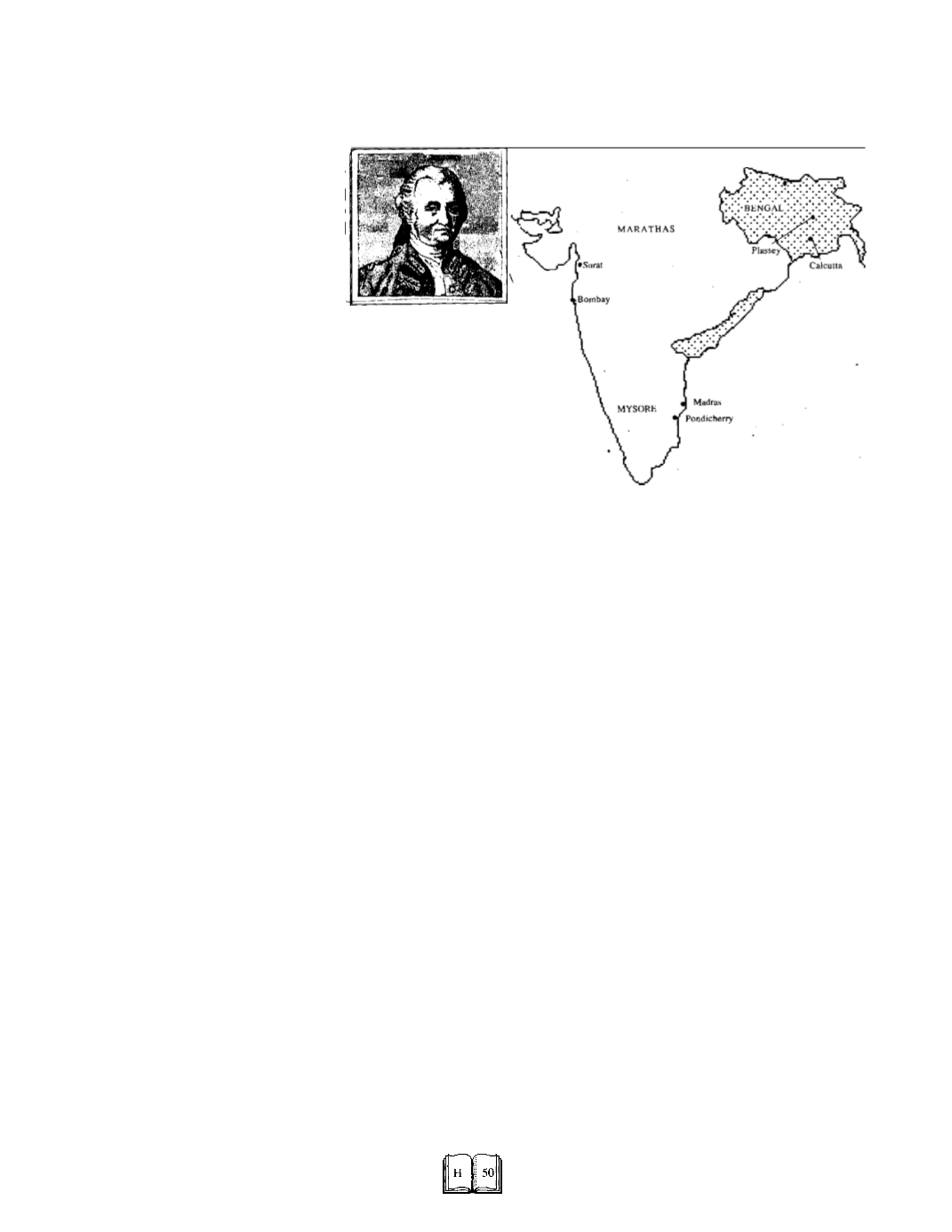

LURE - THRU THE AGES
Eternal India
encyclopedia
EAST INDIA COMPANY
1600-1858 A.D.
Overview
*
The East India Company received a
Charter on December 31, 1600 from
Queen ElizebetH, which granted the
Company monopoly of Eastern trade
for 15 years .
*
Gradually from trade the British mo-
nopolised the political power in the In-
dian sub-continent.
*
Lack of unity among the Indian rulers
facilitated
East
India
Company's
growth.
*
3 Carnatic wars destroyed the influ-
ence of French in India.
*
The battle of Plassey (1757) at which
Robert Clive defeated Siraj-ud-daula, Na-
wab of Bengal, gave the British a firm
footing in Bengal. Mir Jafar, Siraj-ud-
daula's general who had conspired with
Clive, was made the N a wab. The battle
of Buxar (1764) at which Major Hector
Munro defeated Mir Kasim, who had been
installed as Nawab following the depo-
sition of Mir Jafar, confirmed the British
as the masters of Bengal.
*
The rule of the East India Company ended
in 1858 with the assumption of the ad-
ministration of India directly by the Brit-
ish Crown.
Warren Hastings consolidated British
power in India; Lord Cornwallis' settle-
ment of land revenue made the zam-
indars permanent owners of the land
subject to the payment (if a fixed annual
revenue to the government; Wellesley
crushed Tippu Sultan of Mysore; Bentinck
abolished
Sati
and made English the
medium of education; Dalhousie intro-
duced the Doctrine of lapse, under which
native states were annexed if their rulers
died leaving no natural heirs.
Advent
*
An Association of Merchants was
granted a Charter by Queen Elizabeth I
in 1600 A. D. to carry on trade between
Britain and the East Indies. The early
voyages of the English were to Suma-
tra, Java and the Moluccas to obtain a
share of the spice trade which was a
Dutch monopoly. But the English failed
to get a foothold in the East Indies,
because of Dutch opposition and turned
to India. The Company came to have
increasing political involvements in India
along with increasing control from the
GURKHAS
• Delhi
Robert Clive
*
Robert Clive started his career as a clerk
in the British East India Company.
*
Actively took part in the Carnatic War
and responsible for the Fall of French in
India.
*
Clive had been a servant of the Gover-
nor of Madras and the Council of Ma-
dras, when he won the battle of Plassey.
His position was regularised when the
Calcutta council in 1758 elected him to
the Governorship of Bengal.
*
He left for England in 1760 the Com-
pany sent him back to Calcutta in 1765.
He left India finally in 1767.
British India in 1765, after the
victories of Robert Clive
British Goverment and a decreasing in-
volvement in trade, until in 1858 the
company charter was revoked and all of
its territories in India were placed directly
under the Crown.
Charter
Queen Elizabeth I granted to "The
Governor and Company of Merchants of
London, trading with the East-Indies, the
following charter in 1600:
"....
We do order, make, ordain, constitute,
establish and declare, by these presents
and that by the same name of governor and
company of Merchants of London, trading
into the East Indies, be and shall be at all
times hereafter, persons able and capable in
law to have, purchase, receive, possess,
enjoy and retain, lands, rents, privileges,
liberties,
jurisdictions,
franchises
and
hereditements of whatsoever kind, nature
and quality so ever they be, to them and
their successors".
Before the advent of the English, there
were many other nations trading in India,
eg. Dutch, Portuguese, French, Denmark
etc.
Trading
First Headquarters at Surat (1612); later
Bombay (1674). Factory at Madras and
Hooghly
(1651).
Replaced by Fort William
factory (1690). Main trading articles were:
cotton, cotton yam and indigo (Gujarat) pepper
and other spices (Malabar) precious goods,
yam and sugar (Madras and South East Coast)
silk and salt (Bengal).
Chronology
*
Robert Clive
(1758-
*
Warren Hastings
*
Lord Cornwallis
*
Sir John Shore
*
Lord Wellesley
*
Lord Minto
*
Lord Hastings
*
Lord William Bentinck
*
Lord Hardinge
60 & 1765-67)
(1772-1785)
(1786-1793)
(1793-1798)
(1798-1805)
(1807-1813)
(1813-1823)
(1828-1835)
(1844-1848)
(1848-1856)
Wars (till 1856)
*
First Carnatic War (1746-48) (between
French and British East India Companies,
triggered off by the War of Austrian
Succession (1740-48) in Europe).-
*
Second Carnatic War (1748-54)
*
Third Carnatic War (1756-63)
*
Battle of Plassey (1757)
*
Battle of Buxar (1764)
















